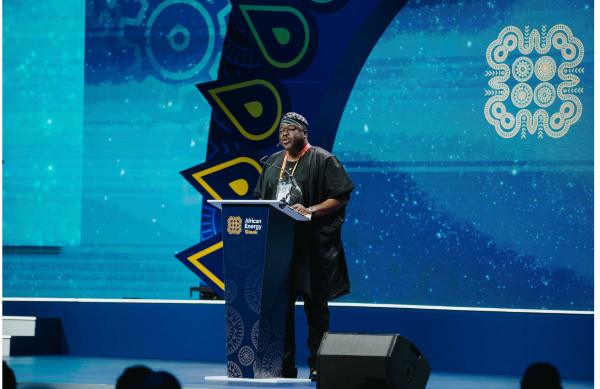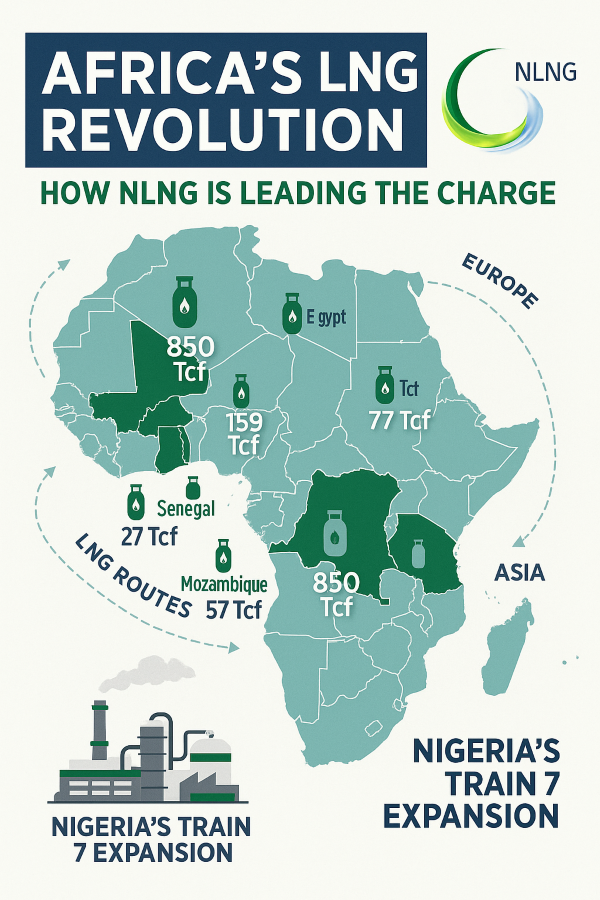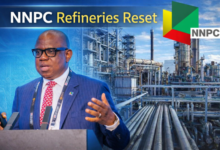NLNG Calls for African-Led Energy Future as Continent Rises in Global LNG Market

At the Africa Energy Week (AEW) 2025 in South Africa, the Nigeria LNG Limited (NLNG) issued a bold call for African nations to assert themselves as key global players in the liquefied natural gas (LNG) industry, moving beyond the role of raw material suppliers to value creators in the global energy chain.
Delivering a keynote address titled “The Role of African LNG in a Dynamic Export Market,” NLNG’s Deputy Managing Director, Olakunle Osobu, said Africa must not remain a bystander in the global discourse on energy security, affordability, and sustainability.
“Africa is a rising pillar of global LNG supply, and Nigeria has a duty to lead,” Osobu declared, underscoring the continent’s vast natural gas potential and the need for strategic collaboration to unlock it.

Africa’s Untapped Power: 850 Trillion Cubic Feet of Natural Gas
Osobu noted that Africa possesses over 850 trillion cubic feet (tcf) of natural gas reserves, representing nearly 6% of total global reserves. With such resources, he said, Africa has both the position and ambition to double its share of the global LNG market within the next decade.
He emphasized that Africa’s growing role in global energy must be backed by strategic investments, infrastructure development, and policy coherence.
“The world is watching how Africa positions itself,” he said. “We must move from exporting potential to exporting performance.”
According to the NLNG chief, emerging LNG projects across the continent — from Mozambique to Senegal, Tanzania, and Mauritania — represent over 45 million tonnes per annum (MTPA) of new supply capacity.
If realized, Africa’s LNG output could rise from 70 MTPA today to 120 MTPA by 2035, cementing its status as a core global LNG hub alongside Qatar, the United States, and Australia.
Nigeria’s Leadership Through NLNG Train 7 Expansion
Highlighting Nigeria’s trailblazing role, Osobu pointed to NLNG’s Train 7 expansion project as evidence of the nation’s continuing leadership in Africa’s LNG space.
The $5–6 billion project, currently nearing completion, will increase NLNG’s production capacity from 22 MTPA to 30 MTPA, further strengthening Nigeria’s global LNG footprint.
“Our investment in Train 7 reflects Nigeria’s determination to remain at the forefront of Africa’s gas transformation — not only for export but for domestic value creation and industrialisation,” Osobu said.
He added that the expansion aligns with Nigeria’s Decade of Gas initiative, which aims to deepen domestic gas utilisation for power generation, manufacturing, and transport.
Africa’s Strategic Advantage — and Its Greatest Hurdles
Africa, Osobu observed, has natural geographic advantages that can make it a preferred LNG supplier to both Europe and Asia, with shorter shipping routes and flexible logistics.
However, he cautioned that competitiveness, access to finance, and low-carbon compliance remain the continent’s biggest challenges.
Global LNG powerhouses like Qatar and the United States are scaling production aggressively, while investors and financiers now demand carbon-conscious projects aligned with the world’s decarbonisation agenda.
“Africa must show it can produce LNG that is clean, affordable, and reliable — while also supporting its own industrial development,” Osobu stressed.
He urged African producers to integrate carbon capture technologies, adopt renewable-powered operations, and invest in gas-based petrochemicals and fertilizers, to build diversified energy economies that create jobs and enhance resilience.
Energy for Growth: Balancing Exports with Domestic Development
Osobu maintained that Africa’s LNG strategy must strike a critical balance — between supplying the world reliably and energising its own people and industries.
“Our journey must not only feed global energy demand; it must fuel African prosperity,” he said.
“We have to build domestic gas markets, power African homes and factories, and lift millions out of energy poverty.”
This approach, he noted, aligns with global Sustainable Development Goals (SDGs) and the Paris Climate Agreement, ensuring Africa’s participation in the energy transition is both responsible and profitable.
Africa Energy Week 2025: A Platform for Transformation
Organised by the African Energy Chamber, Africa Energy Week 2025 convened policymakers, financiers, investors, and industry leaders to chart a unified vision for Africa’s energy independence.
Key discussions focused on infrastructure financing, energy transition pathways, regional gas cooperation, and carbon innovation — all aimed at positioning Africa as a credible global energy partner.
Industry analysts at the event agreed that for Africa to capture greater market share, policy stability, fiscal incentives, and inter-governmental cooperation must improve significantly.
As one delegate noted, “Africa’s energy future depends on integration — of markets, of policy, and of purpose.”
BRANDECONOMY ANALYSIS: From Resource Extraction to Energy Empowerment
Nigeria LNG’s message resonates far beyond the conference hall — it reflects a broader continental awakening.
Africa’s energy narrative is shifting from raw material dependency to value-driven industrialisation.
For decades, the continent’s energy exports enriched others while leaving local economies underpowered.
But the tide is turning: with massive reserves, new LNG projects, and a young population, Africa is poised to become not just a supplier of gas, but a strategic architect of global energy stability and becoming leaders in global LNG Market.
However, to achieve this, African nations must:
✅ Prioritise local content and in-country value addition
✅ Build regional infrastructure for shared prosperity
✅ Invest in cleaner technologies and green LNG
✅ Create transparent fiscal regimes that attract long-term capital
If these align, the continent could transform its energy wealth into inclusive growth, employment, and sustainable industrialisation.
BRANDECONOMY TAKEAWAY
NLNG’s call is clear: Africa must no longer sell raw resources and buy back finished products — it must lead in the global LNG conversation.
The Train 7 expansion is more than an industrial milestone; it is a symbol of Africa’s readiness to shape its own destiny in a rapidly changing energy world.
With coordinated leadership, innovation, and sustainable finance, Africa can redefine its place — not as a participant, but as a powerhouse of clean, reliable, and equitable energy for the 21st century.












